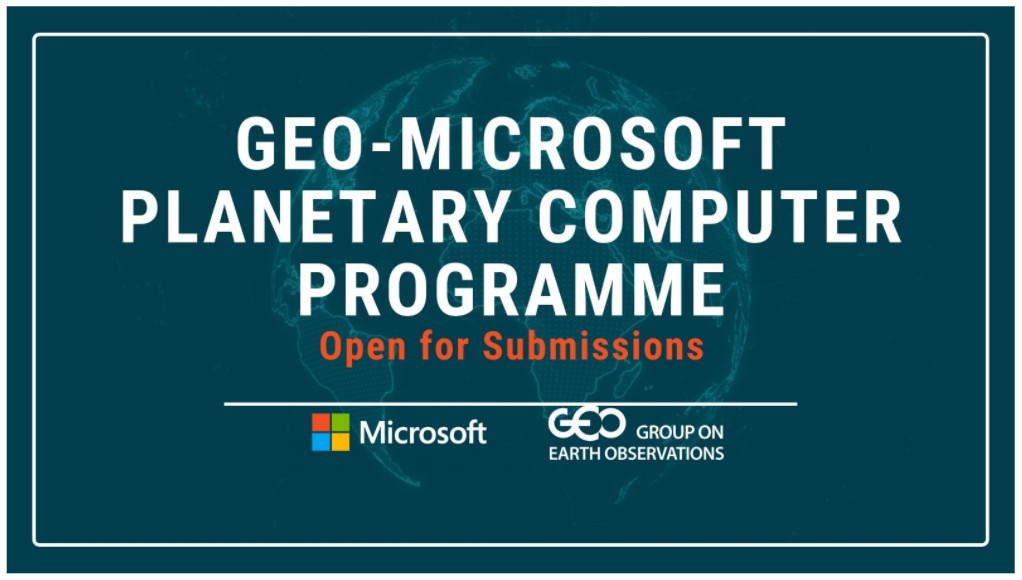GEO-Microsoft Planetary Computer Programme
Blog / September 27, 2021
The GEO-Microsoft Planetary Computer Programme invites the GEO community to be among the early adopters of Microsoft's Planetary Computer. This is a multi-petabyte catalog of global environmental data with intuitive Application Programming Interfaces (APIs) and applications. Grantees will be able will be able to help shape the development of the platform in its early stages. They can utilize open data and analytical tools, including being the first to access NICFI Satellite Data Program on Azure.
This programme will support a number of 12-month projects that use the Planetary Computer to apply Earth observations to address environmental challenges, within the context of a Flagship, Initiative or Community Activity of the GEO Work Programme (GWP).
FAQ
Please consult the Frequently Asked Questions here.
Successful applicants will receive:
- Access to the Planetary Computer
- Up to US $60,000 in financial support for 12 months
- Up to US $60,000 Microsoft Azure credits. Recipients will have access to these credits for a total of three years, allowing them time to scale their solutions
- Resources provided through the Microsoft AI for Earth grants program, including technical advice and support, online Azure training materials, networking and educational opportunities
Eligibility
- Projects must use the Planetary Computer to build their solution. This includes using at least one of the datasets from the Planetary Computer Data Catalog.
- Projects must be developed and scaled using Microsoft Azure.
- Applicants must be associated with research institutions from GEO Members and/or Participating Organizations.
- Projects should contribute to and be endorsed by the leadership of the Flagship Initiative or Community Activity of the GWP on whose behalf the proposal is submitted.
- All data, software and products developed within the project resulting from this open call will be made available to the GEO community following the principles and procedures stated in Section 3.4 (Ethical Standards and Intellectual Property) of the GEO Rules of Procedure and may be considered for inclusion in the Planetary Computer.
- To enable the global community of researchers to innovate together and build on each other’s work, project deliverables must be made publicly available: data (including in situ, marine and spaceborne) as per the GEOSS Data Sharing Principles and code as open source scripts and software.
Timeline
|
27 September 2021
|
Open call for project proposals.
|
|
25 October 2021
|
Initial draft of full proposal submitted to GEO Secretariat Senior Scientist, Douglas Cripe (dcripe@geosec.org). The proposal will be forwarded to the leadership of relevant GWP Flagship, Initiative or Community Activity to be considered for endorsement.
|
|
29 November 2021
|
Deadline for final draft proposal submissions (with endorsement) to the GEO Secretariat Senior Scientist.
|
|
December 2021
-
January 2022
|
Evaluation of grant applications by the evaluation committee.
|
|
February 2022
|
Successful applicants are notified.
|
|
February 2022
|
Recipients have completed due diligence
- Reviewed and signed contract with GEO Secretariat
- Completed Azure account set-up and onboarding with Microsoft
|
|
February 2023
|
Project reports and deliverables due.
|
Application Instructions
Please refer to Annexes A: Application Template for more detailed application instructions. Email the completed application to the GEO Secretariat Senior Scientist, Douglas Cripe (dcripe@geosec.org) by the deadline of October 25, 2021 23:59 PM UTC. Each Principal Investigator can submit one application for consideration.
Selection Criteria
Projects will be selected by a panel of reviewers consisting of individuals from the GEO Secretariat, the GEO Programme Board and Microsoft AI for Earth. Criteria for selection will include:
- Degree to which the proposed project leverages Planetary Computer and Azure capabilities, and represents technological innovation.
- Tangible data products and cloud-based workflows and tools that demonstrate applications of Earth observations within the scope of GWP Flagships, Initiatives or Community Activities (with leadership endorsement).
- Potential for project deliverables to be scaled and used by others, including other GEO Members and Participating Organizations.
- Suitability of team members’ skill sets to carry out the project.
Project Delivery
- Grantees will sign a contract with GEO for the disbursement of project funds and are responsible for allocating and justifying expenditure in accordance with the approved project.
- Grantees will submit a mid-year report, and a final report one year from the start date of the project. They will continue to have access to their sponsored Azure accounts for two additional years to more broadly scale their datasets, data products, and tools.
- Project development, implementation and results will be monitored by the GEO Secretariat in collaboration with Microsoft. Grantees will retain all intellectual property developed over the course of the project.
- Grantees are expected to be active in both the Microsoft AI for Earth and GEO communities. They will have opportunities to present their results at Microsoft and GEO events.
More about the Planetary Computer
The Planetary Computer is a platform built on Microsoft Azure that consists of the following components:
- Data Catalog: petabytes of Earth systems data hosted on Azure and made available to users for free. About 30 datasets are available, including:
- APIs: enable users to search for data they need across space and time
- Hub: fully managed computing environment makes data and APIs accessible via open source tools, and allows users to easily scale their analyses
- Applications: Successful applicants may have their completed projects considered for inclusion as Planetary Computer applications
GEO and Microsoft are working together to develop additional tools for decision making and we will update the Planetary Computer website as more functionality becomes available.
For any questions please contact: Douglas Cripe (dcripe@geosec.org)

